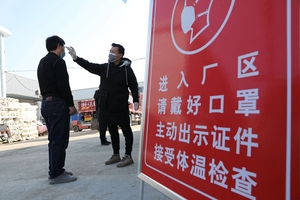Update: Consumer Inflation Remains High Amid Coronavirus Outbreak
Rising food prices kept China’s consumer inflation high in February, with the consumer price index (CPI) up 5.2% year-on-year as the coronavirus outbreak disrupted supply chains and unsettled consumers, the National Bureau of Statistics (NBS) said (link in Chinese) Tuesday.
The CPI rise last month came in lower than the 5.4% growth in January, which represented a high not seen in more than eight years. The latest figure matched the median estimate (link in Chinese) from a Caixin survey of economists. The CPI measures the prices of a select basket of consumer goods and services.
 |
Food prices as a whole rose 21.9% year-on-year last month, contributing nearly 4.5 percentage points to the CPI increase. Pork remained the major driver of the growth, with prices surging by 135.2%. That continued a similar trend of a more than doubling of pork prices, which rose 116% in January due to shortages created by an African swine fever crisis that has lasted more than one year.
High consumer inflation is also being fueled by rising business costs. Supply chains have been disrupted as authorities implemented travel restrictions and extended the Lunar New Year holiday to slow the virus’s spread, according to an NBS statement (link in Chinese). Inflation has also been pushed up by some consumers’ hoarding of food, it said.
Economists at Nomura International (Hong Kong) Ltd. estimated in a note that supply shock due to the epidemic will dominate CPI inflation in the short term, as reflected by the impact on nondiscretionary spending, especially on food.
But the epidemic has also put downward pressure on inflation by hindering discretionary spending by consumers who were told to stay at home, according to the NBS. The tourism, restaurant and hotel industries have been notable victims.
The growth of core CPI — which excludes more-volatile food and energy prices and which economists say better reflects long-term inflation trends — slowed to 1% last month, the lowest in over nine years, according to NBS data compiled by economic data provider CEIC. Services inflation dipped to 0.6%, the lowest level in about 10 years.
Producer prices sunk back into deflationary territory, with the producer price index, which gauges changes in the prices of goods circulated among manufacturers and mining companies, falling 0.4% (link in Chinese) year-on-year in February after rising 0.1% the previous month. The NBS statement attributed the deflation to falling raw materials prices as some factories were forced to close during the outbreak.
Producer inflation could fall further in the coming months, as the recent plunge in oil prices will lower fuel costs, Julian Evans-Pritchard, an economist with research firm Capital Economics Ltd., said in a note.
Contact reporter Guo Yingzhe (yingzheguo@caixin.com) and editor Michael Bellart (michaelbellart@caixin.com)
Caixin Global has launched Caixin CEIC Mobile, the mobile-only version of its world-class macroeconomic data platform.
If you’re using the Caixin app, please click here. If you haven’t downloaded the app, please click here.

- PODCAST
- MOST POPULAR





